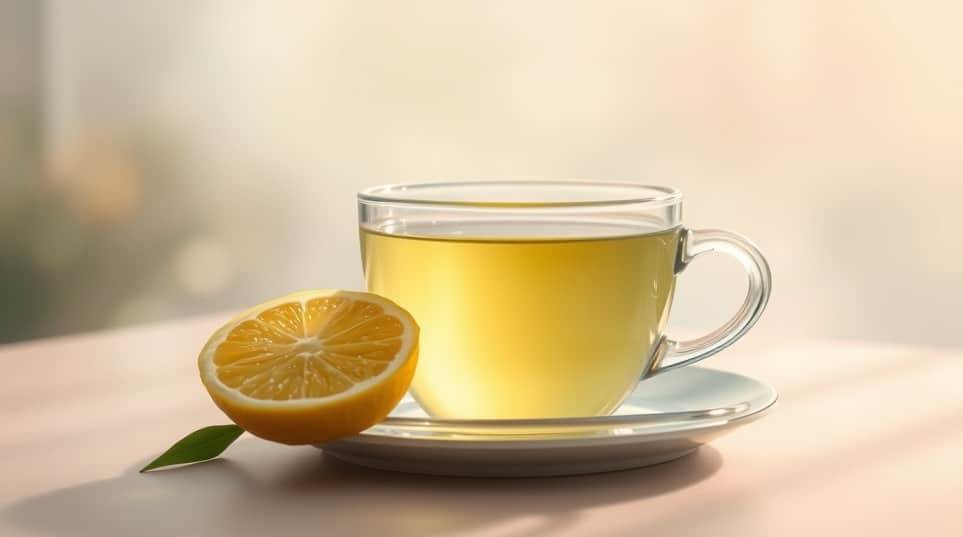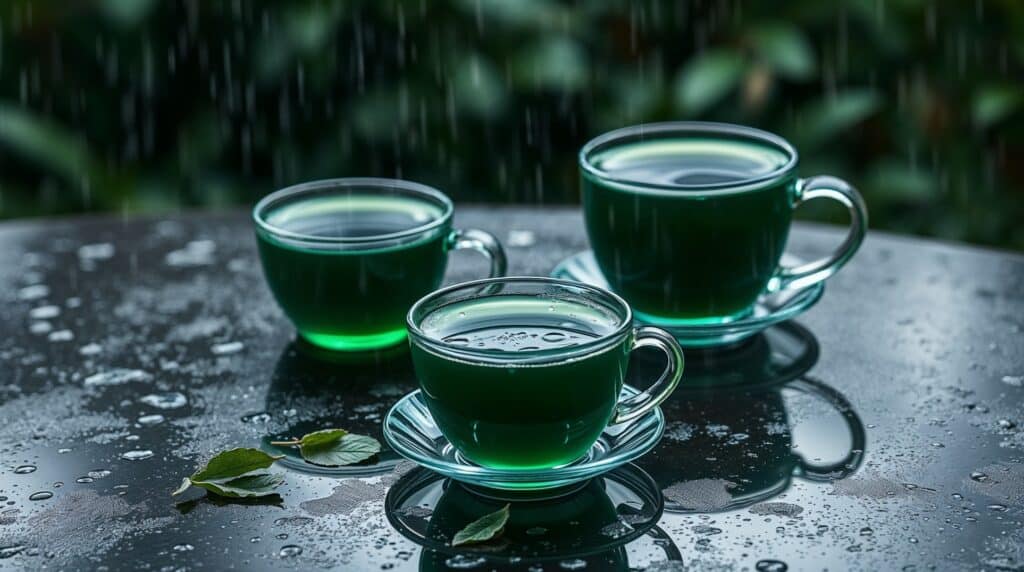Green tea has been celebrated for centuries as a staple of wellness and culture worldwide, particularly in East Asia. However, decaf green tea is an increasingly popular alternative for those sensitive to caffeine or simply looking to avoid it. This article explores everything you need to know about decaffeinated green tea, including its health benefits, its place in Japanese culture, comparisons to other decaf teas, and the delightful pairing of decaf green tea with lemon.
What Is Decaf Green Tea?
Decaf green tea is a green tea that has been decaffeinated to remove most of its caffeine content. While regular green tea contains about 20-50 milligrams of caffeine per cup (depending on the variety), decaffeinated green tea typically retains only trace amounts, usually less than 5 milligrams per serving.
There are two main methods of decaffeination:
- Chemical Solvent Decaffeination involves using chemical solvents like ethyl acetate to extract caffeine. While effective, this process may strip away some of the tea’s natural flavors and antioxidants.
- Carbon Dioxide Process: A more natural and widely preferred method, CO₂ decaffeination uses pressurized carbon dioxide to remove caffeine while preserving most of the tea’s beneficial compounds.
Is Decaffeinated Green Tea Still Healthy?
One of the most common questions about decaffeinated green tea is whether it retains the same health benefits as regular green tea. The short answer is yes—decaf green tea is still healthy, though with some caveats.
- Antioxidant Content:
Decaf green tea retains most of the polyphenols and catechins (notably EGCG) responsible for its antioxidant properties. These compounds help combat oxidative stress, reduce inflammation, and support heart and brain health. However, depending on the decaffeination method, some antioxidants may be lost. - Low Caffeine Levels:
For individuals sensitive to caffeine, decaffeinated green tea is an excellent alternative. It provides green tea’s calming and detoxifying properties without the risk of jitters or sleep disturbances caused by caffeine. - Weight Management:
While green tea is often associated with weight loss, studies show that decaffeinated green tea can still contribute to fat oxidation and metabolism. However, the effect may be slightly less pronounced without caffeine. - Reduced Risk of Disease:
Thanks to its antioxidant profile, regular consumption of decaffeinated green tea is linked to lower risks of chronic diseases like heart disease, type 2 diabetes, and certain cancers.
Do Japanese Drink Decaf Green Tea?

In Japan, where tea culture is deeply ingrained, traditional green tea is predominantly enjoyed in its caffeinated form. Matcha, sencha, and gyokuro—Japanese tea staples—are naturally caffeinated. However, decaf green tea is gaining popularity, especially among health-conscious individuals and those who prefer tea in the evening.
Japanese tea companies have started producing decaf versions of sencha and other varieties to cater to this growing demand. This shift reflects a broader global trend toward decaffeinated options, even in countries with strong traditional tea-drinking cultures.
What Is the Healthiest Decaf Tea to Drink?
decaffeinated green tea is one of the healthiest decaf beverages due to its antioxidant-rich composition and minimal processing. However, when choosing the healthiest decaf tea, here are a few factors to consider:
- Method of Decaffeination:
Look for teas decaffeinated using the carbon dioxide process, as it preserves more antioxidants and avoids chemical residues. - Organic Options:
Organic decaf green tea ensures that it is grown without synthetic pesticides or fertilizers, making it a cleaner choice. - Added Ingredients:
Some decaf teas include additives or artificial flavorings. Opt for brands that offer pure, high-quality tea leaves without unnecessary additives.
Compared to other decaf teas, such as black or herbal teas, decaf green tea is generally lower in calories and more prosperous in antioxidants, making it one of the best choices for overall health.
Can Green Tea Be Caffeine-Free?
While making green tea entirely caffeine-free is nearly impossible, decaf green tea significantly reduces caffeine content to trace levels. For those who want to avoid caffeine altogether, herbal “teas” (technically tisanes) like chamomile, peppermint, or rooibos are excellent alternatives.
If you’re looking for caffeine-free options with similar benefits to green tea, consider rooibos or hibiscus tea. They provide antioxidants and health benefits without any caffeine.
Decaf Green Tea Benefits
decaffeinated green tea offers many benefits, making it a versatile and valuable addition to your diet. Here are some of its top advantages:
- Promotes Relaxation:
decaffeinated green tea allows you to unwind without the stimulating effects of caffeine. The presence of the amino acid L-theanine contributes to a calming effect and improved focus. - Improves Heart Health:
Studies show that green tea, including its decaf variant, helps reduce LDL cholesterol and improves blood vessel function, supporting cardiovascular health. - Supports Skin Health:
The antioxidants in decaf green tea fight free radicals contributing to premature aging and skin damage. Topical application of green tea extract can also soothe inflammation and improve skin texture. - Enhances Digestive Health:
decaffeinated green tea aids digestion and reduces bloating. Its anti-inflammatory properties are beneficial for those with sensitive stomachs. - Boosts Immunity:
The catechins and polyphenols in decaf green tea strengthen the immune system, helping the body fend off infections. - Suitable for Evening Consumption:
Unlike regular green tea, which might interfere with sleep if consumed later in the day, decaf green tea is perfect for nighttime relaxation.
Decaf Green Tea with Lemon

Adding lemon to your decaffeinated green tea enhances its flavor and amplifies its health benefits. Here’s why this combination is a winning pair:
- Boosted Antioxidant Absorption:
- The vitamin C in lemon enhances the body’s ability to absorb catechins from green tea, maximizing its antioxidant effects.
- Improved Digestion:
- Lemon adds a dose of citric acid, which stimulates digestive enzymes and aids in breaking down food. Combined with decaffeinated green tea’s soothing properties, it’s an excellent remedy for digestive discomfort.
- Detoxifying Properties:
- Lemon’s detoxifying and alkalizing effects and green tea’s ability to flush out toxins make this combination ideal for detox routines.
- Weight Management:
- Lemon adds a refreshing, low-calorie flavor to decaf green tea, encouraging hydration and supporting weight loss efforts.
To prepare, steep a bag of decaf green tea in hot water for 3-5 minutes and squeeze in fresh lemon juice. For added flavor and health benefits, add a teaspoon of honey or a sprinkle of ginger.
How to Choose the Best Decaf Green Tea
When shopping for decaf green tea, keep these tips in mind:
- Read the Labels: Check for the decaffeination method and opt for CO₂ processed teas.
- Look for Quality: High-grade green tea leaves yield better flavor and health benefits than lower-quality blends.
- Consider Organic Options: Organic certification ensures the tea is free from synthetic chemicals.
- Experiment with Flavors: Many brands offer flavored decaf green teas, such as mint or jasmine, for a unique twist.
Incorporating Decaf Green Tea Into Your Routine
Decaf green tea is a versatile beverage that fits seamlessly into various parts of your day:
- Morning: Start your day with a warm cup to boost hydration and antioxidant intake.
- Afternoon: Enjoy it as a calming break without the risk of overstimulation.
- Evening: Pair it with lemon or honey for a soothing nighttime ritual.
For a refreshing twist, you can prepare iced decaffeinated green tea with lemon and mint during warmer months.
Conclusion
Green tea is an excellent choice for anyone looking to enjoy the numerous health benefits of green tea without the caffeine. From promoting relaxation and heart health to enhancing skin and immunity, decaffeinated green tea proves that you don’t need caffeine to reap the rewards of this ancient beverage. Whether enjoyed plain, infused with lemon, or incorporated into your daily wellness routine.
So, whether you’re curious about its health properties, cultural relevance in Japan, or its pairing with lemon, this green tea deserves a spot in your pantry. It’s a simple yet powerful way to support a healthy, balanced lifestyle.










